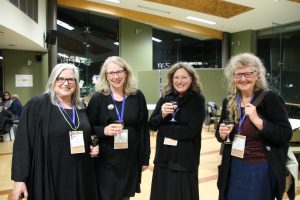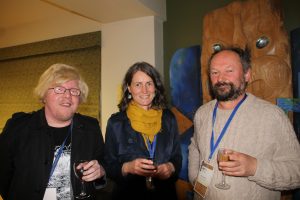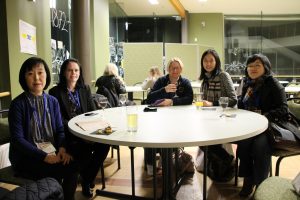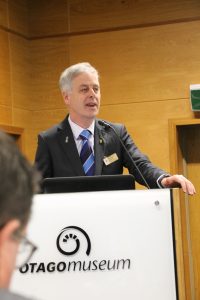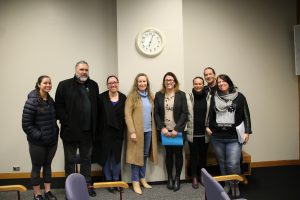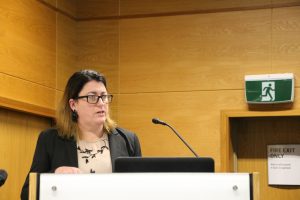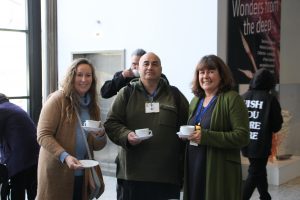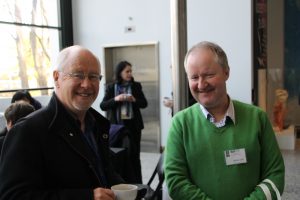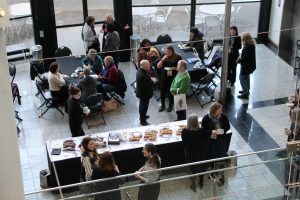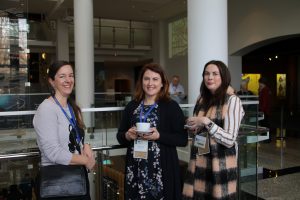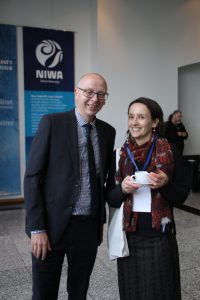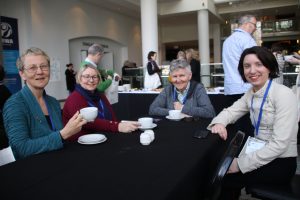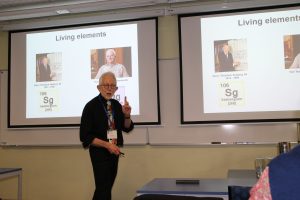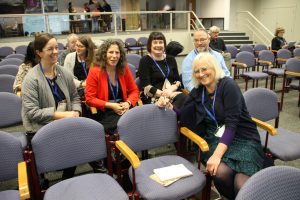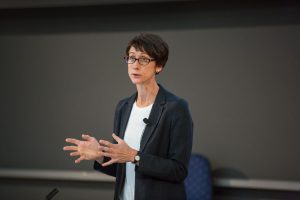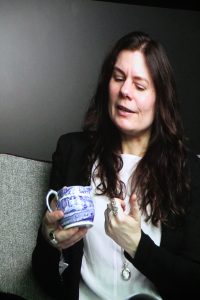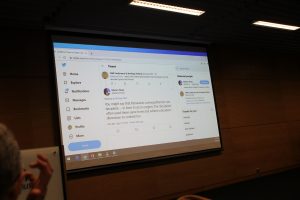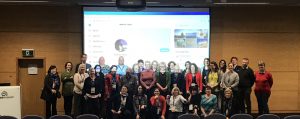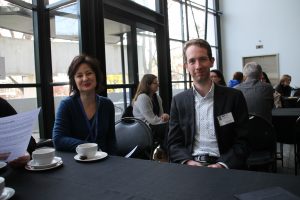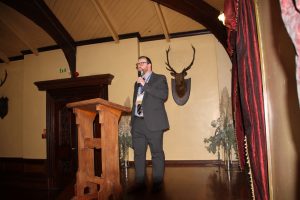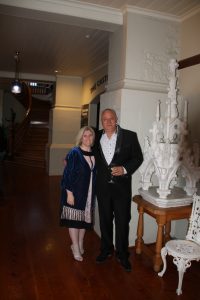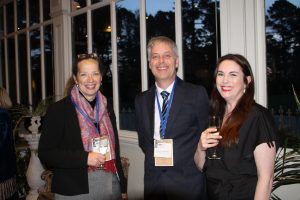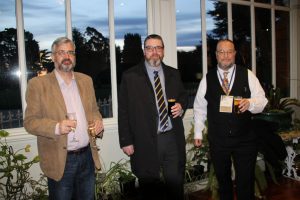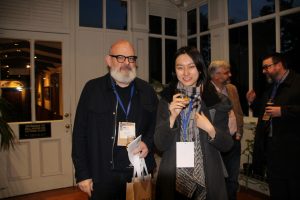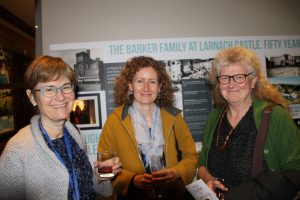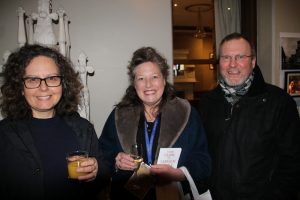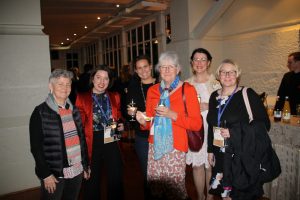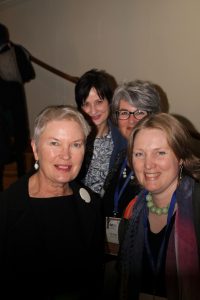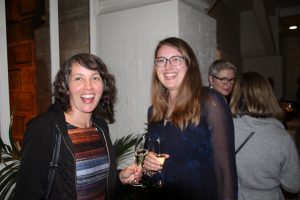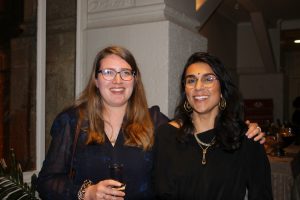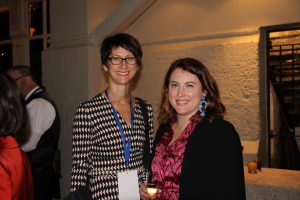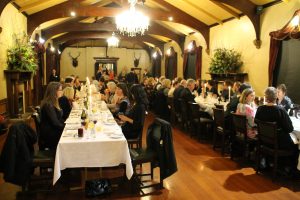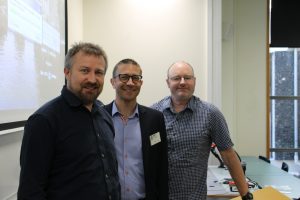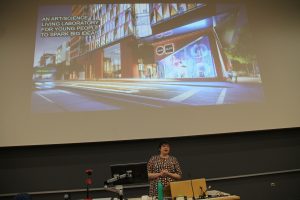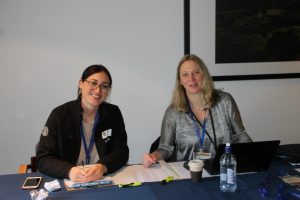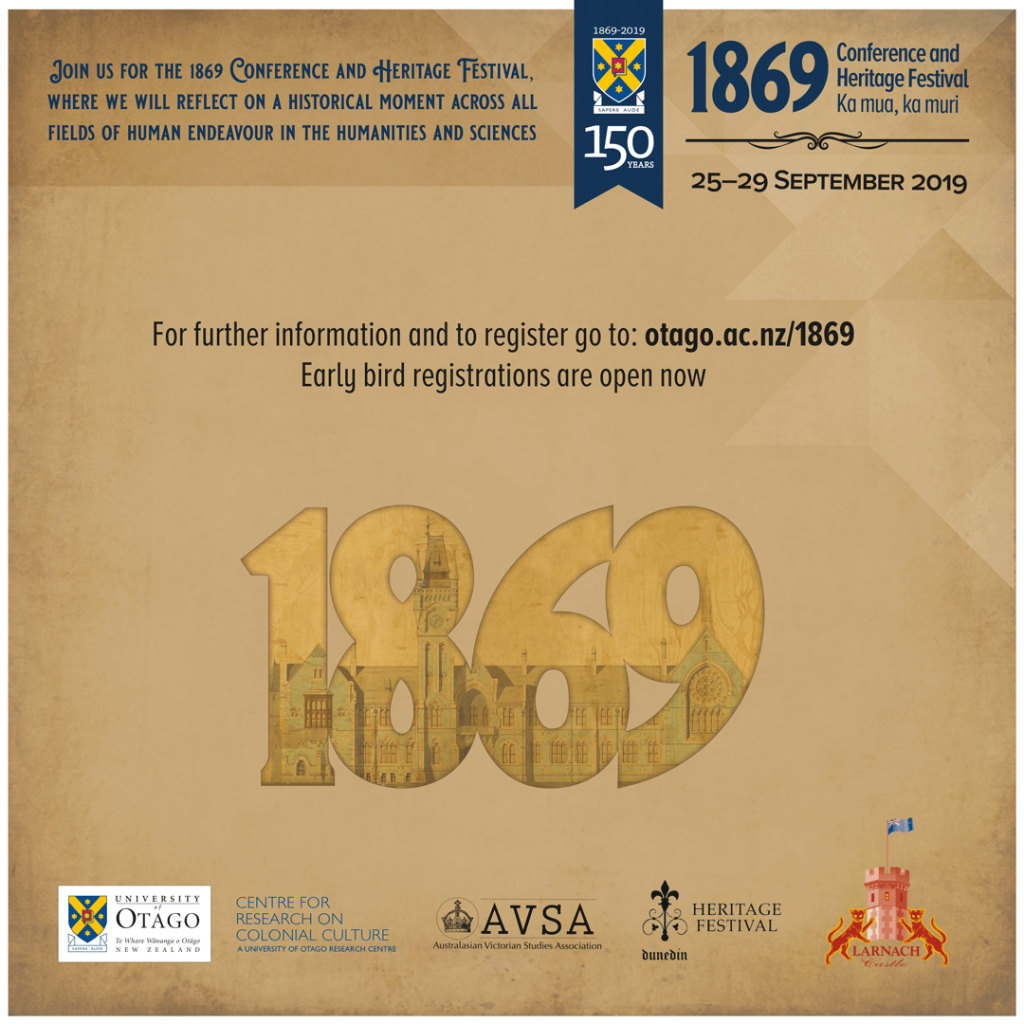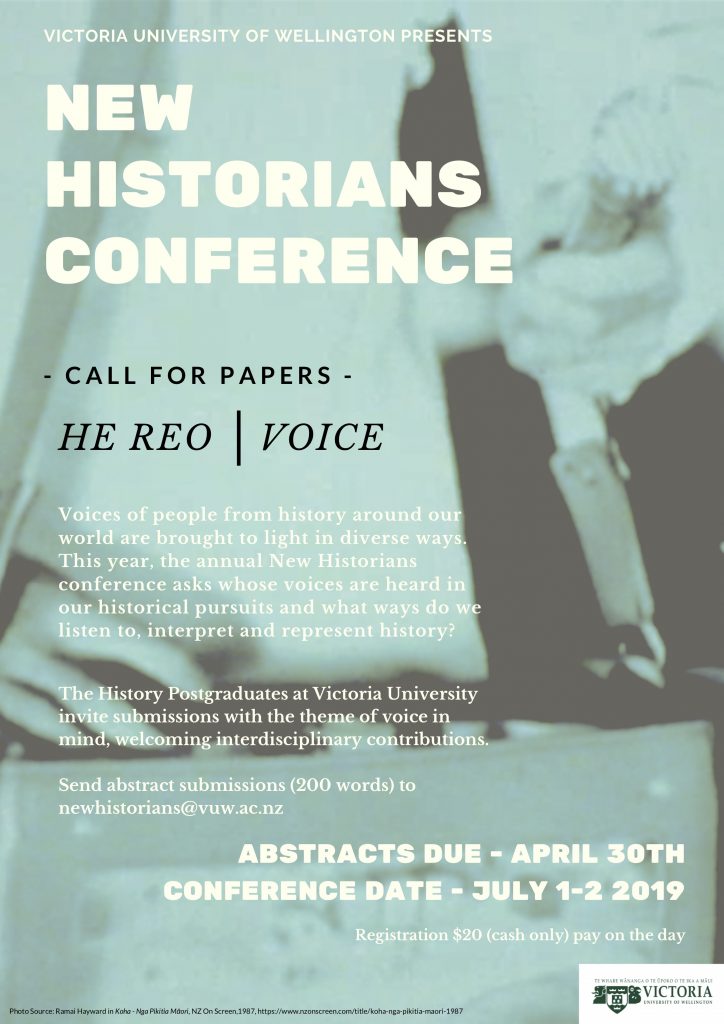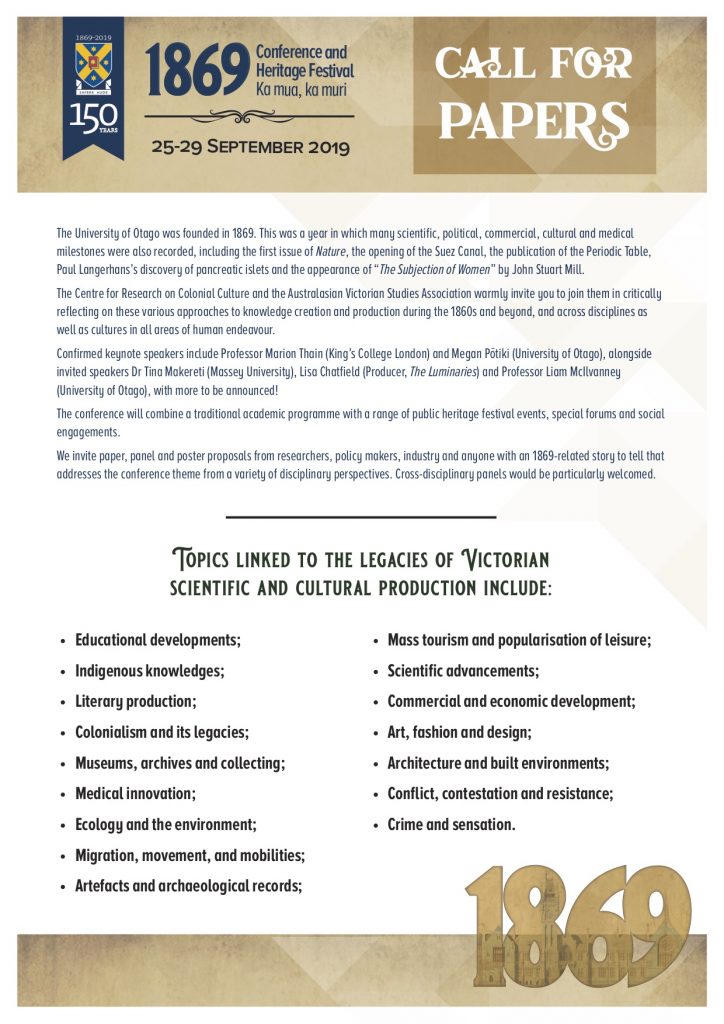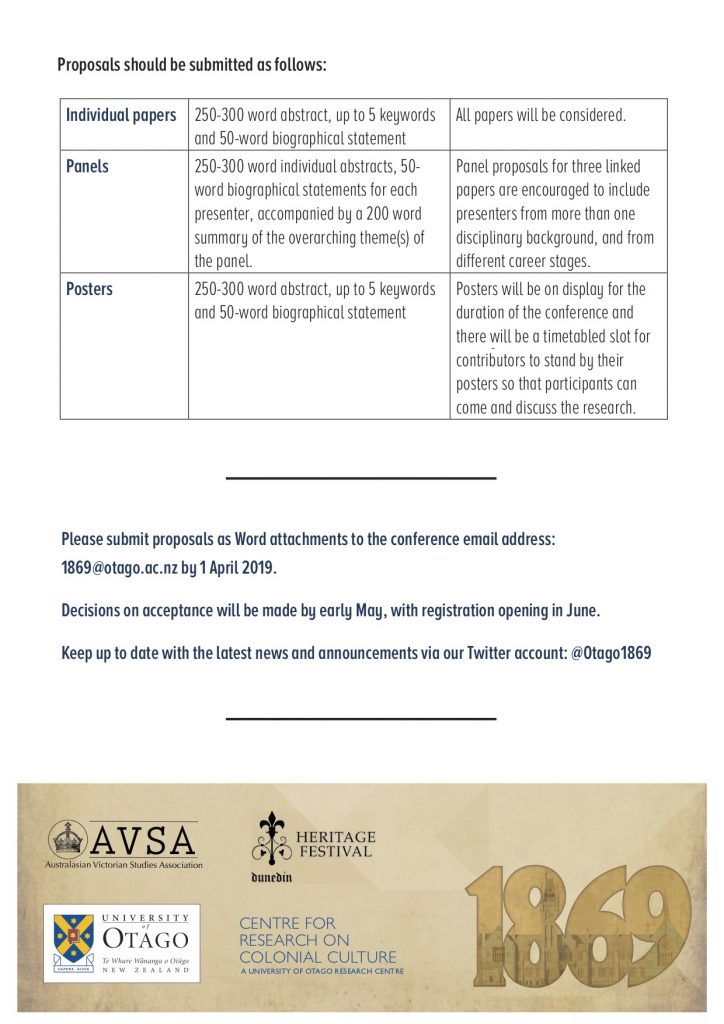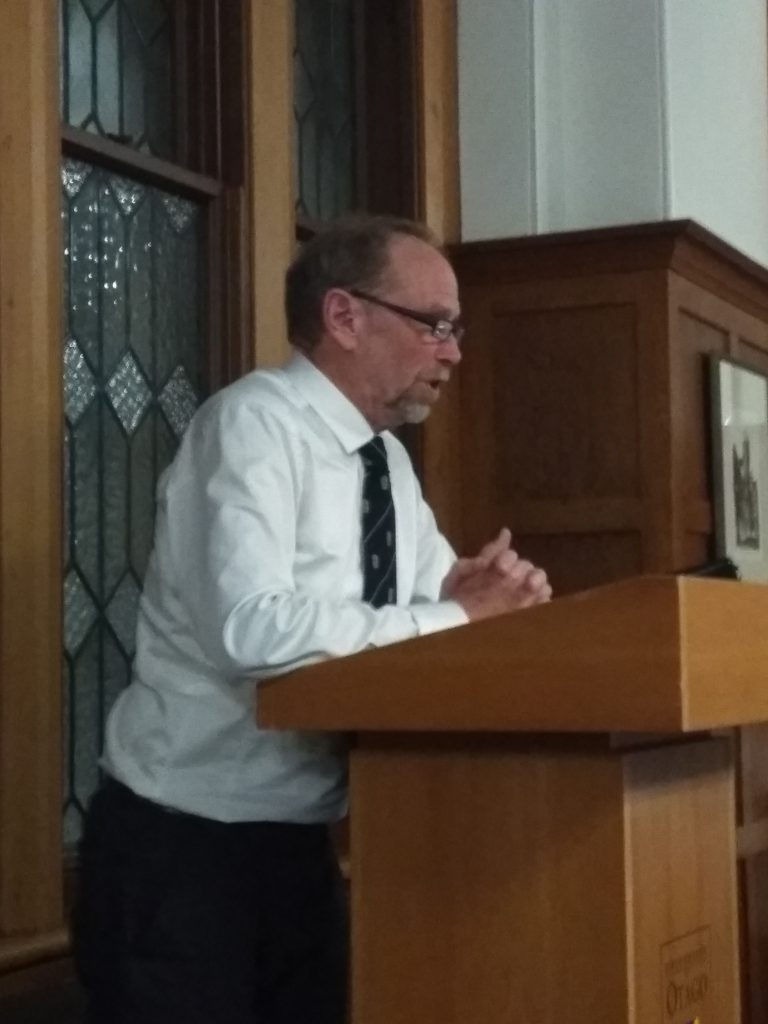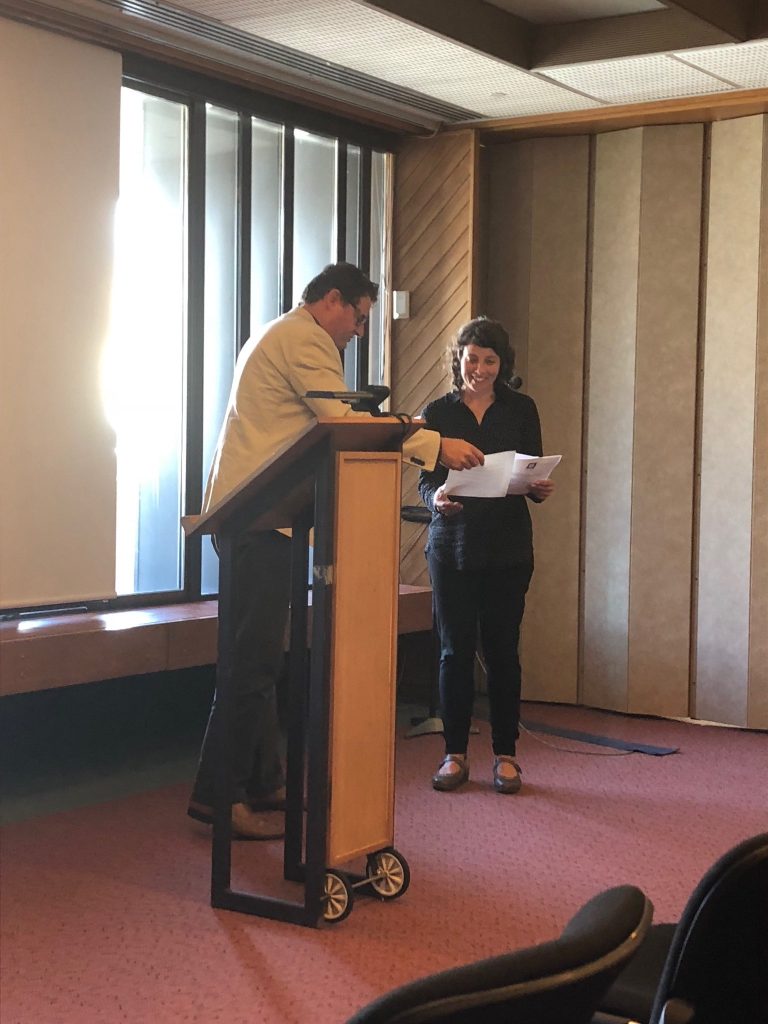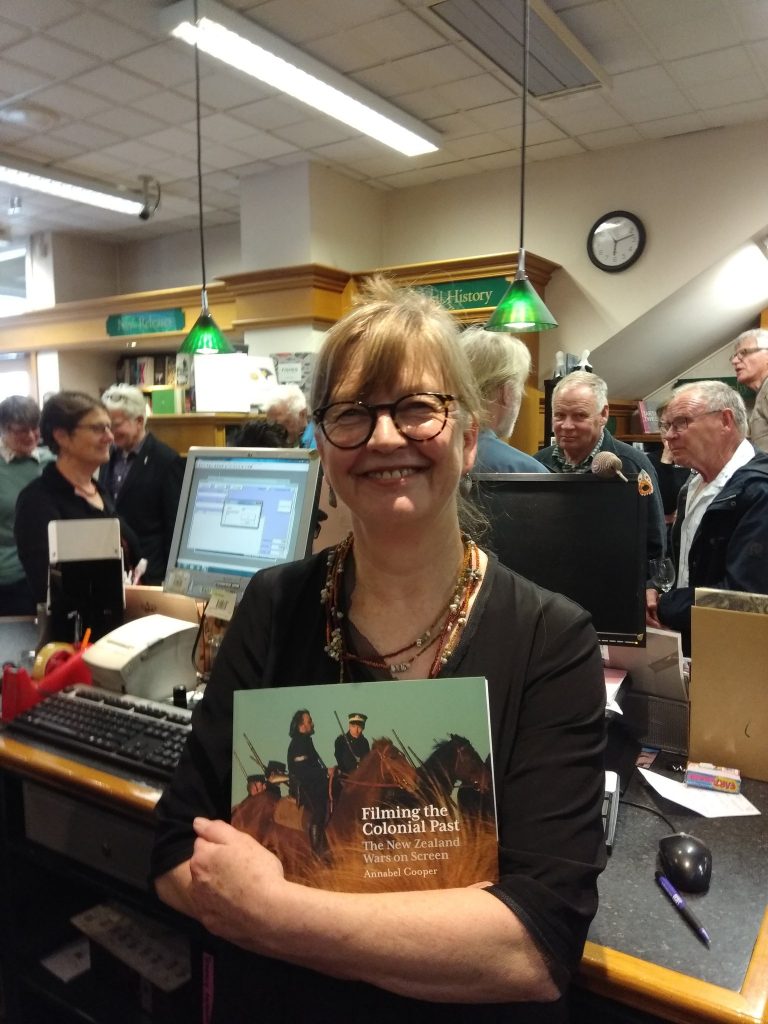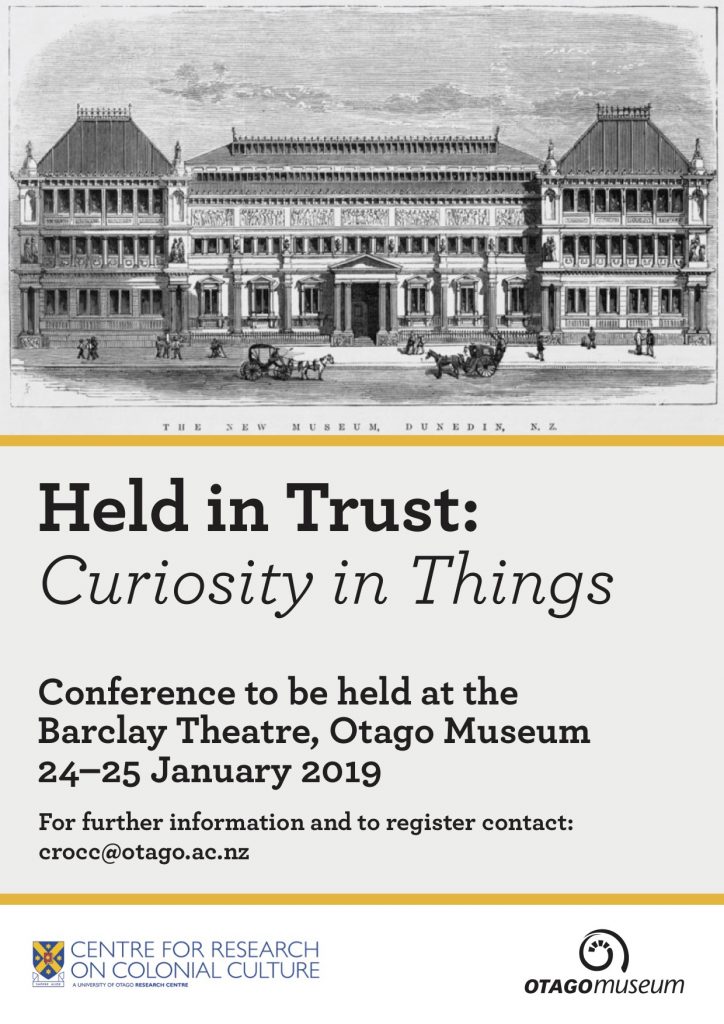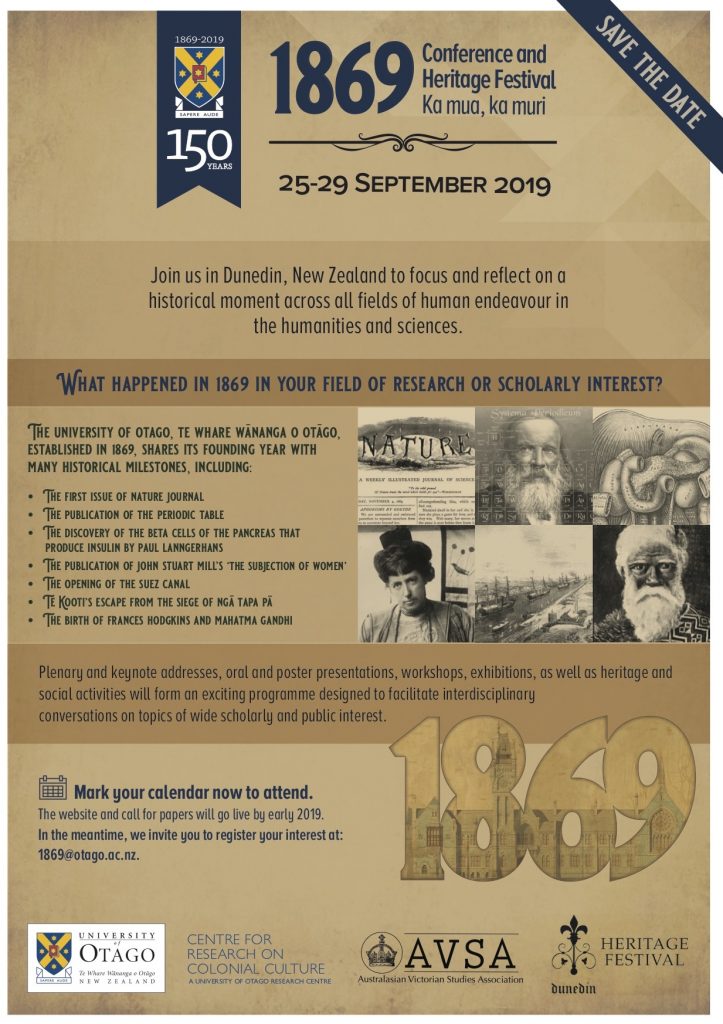The amazing “1869” conference
Otago hosted a brilliant hybrid conference this week, the “1869 Conference and Heritage Festival”. By “hybrid” I mean that it was the annual conference for the Australasian Victorian Studies Association, while also celebrating the University of Otago’s 150th anniversary, and sitting alongside the Dunedin Heritage Festival. While the Centre for Colonial Culture was a key sponsor, with Associate Professor Angela Wanhalla as one of the co-convevors (together with Kirby Hallum), a cross section of the university’s faculty was represented on the organising committee. The melange meant that most people engaged with papers that they would normally never encounter at their more usual disciplinary conferences, although this added to, rather than diminished, the event’s success. [See below for photos]
On Wednesday evening, the conference began with an all-women panel, looking at “Heritage through Words, Pictures and Threads”. Chaired by Kirby, the panel featured the novelist and academic, Tina Makereti, who discussed her latest novel, The Imaginary Lives of James Poneke; Lisa Chatfield, the producer for the BBC television adaptation of The Luminaries; Madeleine Seys, author of Fashion and Narrative in Victorian Popular Literature; and Otago’s Catherine Smith, an expert behind the science of traditional Māori weaving. This was a wonderful collaboration, exciting for those interested in the sumptuous garments of the Victorian era, but also drawing a number of different “threads” together. This was followed by a reception held in Te Tumu: School of Māori, Pacific and Indigenous Studies.
1869 was formally opened in the Otago Museum on Thursday (26 September) with a mihi whakatau from Tuari Pōtiki representing both Kāi Tahu and the university, a short welcome from the DVC Research, Professor Richard Blaikie, and an amusing and uplifting speech from the Hon Grant Robertson, an Otago alumnus as well as the current (among other portfolios) Minister for Arts, Culture and Heritage. The PVC Humanities, Professor Tony Ballantyne then introduced the first keynote speaker, Megan Pōtiki of Te Tumu, who discussed how the school established in 1869 contributed to the demise of the speaking of te reo Māori at Ōtākou, just under 30 minutes drive from the city. However, in more recent years the concerted efforts of local people have seen the revival in the language at the kāik.
There are too many individual presentations to mention them all. Most were what one might expect at a history or literature conferences, but also sprinkled with a few science-orientated talks as well. Several stand out, such as the presentation by Dr Ian Chapman on the links between Jules Verne’s From the Earth to the Moon with David Bowie’s Space Oddity – including a live band!; Lyndon Fraser’s swirling PowerPoint while discussing women’s wills in Victorian Canterbury; and Lyall Hanton’s physically animated talk on Joseph Mellor’s 16 million words on the Periodic Table. But the organisers were gratified at the high quality of all the panel presentations.
The conference highlights, of course, were the keynotes. On Thursday evening, people braved a dismal night to listen to Helen Pearson, editor of Nature, a journal that shares a 150th birthday with the university. Helen gave a wonderful talk on the past, present and future of this illustrious journal, noted not just for its academic papers but the science reporting and commentary. The “past” incorporated some of the journal’s many key publications, such as Francis Crick and James Watson’s groundbreaking paper on DNA in 1929, as well as a notable failure, an account on cold fusion. Helen also discussed Nature’s current situation, and how that may change with the growing demand for open-access publications.
Marian Thain, of Kings College London, was unable to make it to Dunedin for the conference, but nevertheless presented on“Cosmopolitanism, Nationalism and the Politics of Parnassian Poetry (1860s-1880s)” on Friday. An exploration of how English poets adapted the ballade, a French poetry genre, the talk discussed how the Parnassian poets’ efforts spawned tensions between those who favoured a more international outlook and those who advocated for more British forms of verse. Marion pre-recorded her video presentation, and invited questions via Twitter both during and after its viewing, which worked really successfully. Indeed, the conference goers included a number of enthusiastic tweeps, with the conference at one point trending up to 5th place in New Zealand’s Twitter rankings. See #otago1869 and #avsa2019.
Conference goers were treated on Friday evening to a bus trip up to the historic Larnarch’s Castle atop the Otago Peninsula. On arrival, just before dusk, the swirl of bagpipes greeted us as we alighted the buses and entered the castle. After newcomers had undertaken a tour of the building and we had all had the opportunity to wet the whistle, we all entered into the banquet hall for a marvellous feast. The “entertainment” for the evening was Professor Liam McIlvanney, who gave a wonderful speech arguing that Rev Thomas Burns, the nephew of the great poet, the first clergyman of Dunedin’s Free Kirk settlement, and first Chancellor of the University, was perhaps not the “censorious old bigot” that secularist historians have labelled him.
Tilly Boleyn, the Curator of Science Gallery Melbourne, was our final keynote to round off the conference. Tilly discussed how hard it was to entice young people (18-25 year olds) into science museums, which are seen as boring and irrelevant. The answer has been to establish “science galleries”, and international network tied to local universities, but whose “displays” are about engaging the public with science and art. Melbourne’s science gallery opens next year, but in the meantime they have run a number of “pop-ups” to prepare the ground. An important feature of this new style of institution has been to allow young people themselves to decide what will be presented, and to employ young people to “moderate” the exhibits with the gallery visitors. This new methodology means curators giving up power, which Tilly states, is both challenging and rewarding.
At the final wrap-up, the AVSA president Mandy Treagus announced that the next AVSA conference will be held in Melbourne at Monash University in June, 2020.
And another viewpoint from the Women Historians Blog.
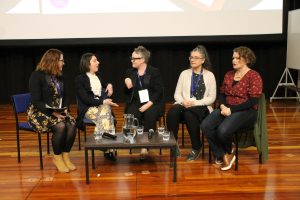
The first evening. Kirby-Jane Hallum, Madeleine Seys, Catherine Smith, Lisa Chatfield and Tina Makereti.
1869 Conference and Colonial Knowledges CFP
A draft programme for the 1869 conference is available, and registration is open. Please check out the conference website and make sure you register for what looks like a fantastic programme, including some amazing keynotes and invited speakers.
Also of interest is a CFP for a February 2020 event at the University of Manchester on Colonial Knowledges: Environment and Logistics in the Creation of Knowledge in British Colonies from 1750 to 1950. Check out the Call for Papers here. Abstracts are due 23 August.
CFPs: New Historians, NZHA, 1869, Encounters and Exchanges
If you are looking to participate in a New Zealand history conference this year then you are spoiled for choice with the New Zealand Historical Association’s biennial conference taking place later his year, as well as an event on the theme of Encounters and Exchanges aligned with the Tuia 250 commemoration programme. There’s also the 1869 conference and heritage festival in Dunedin and the annual New Historians conference.
You’ve got plenty of time to think about a possible contribution. The NZHA Conference (27-30 November) has extended its call for papers to Friday 26 April (read more here). The 1869 Conference (25-28 September) call for papers has also been extended, to Monday 29th April (find out more here). For information on Encounters and Exchanges (1-3 December), check out their website. You have until May 8th to submit an abstract for that event.
Postgraduates in New Zealand history programme should definitely consider attending the New Historians Conference (1-2 July, Wellington). It’s a great opportunity to network and build connections with other postgraduates, and to engage in the latest cutting-edge research. This year the theme is He Reo: Voice and abstracts are due by 30 April.
1869 Conference
As part of the University of Otago’s commemoration activities, the Centre for Research on Colonial Culture (CRoCC) and the Australasian Victorian Studies Association (AVSA) are co-hosting a conference and heritage festival on ‘1869’ from 25-29 September 2019. A call for papers is below. The closing date for abstracts is 1 April 2019.
1869 was a year in which many scientific, political, commercial, cultural and medical milestones were also recorded, including the first issue of Nature, the opening of the Suez Canal, the publication of the Periodic Table, Paul Langerhans’ discovery of pancreatic islets and the appearance of The Subjection of Women by John Stuart Mill.
The organisers welcome abstracts, panel proposals and posters from all disciplines and perspectives, and particularly encourage postgraduate participation.
- The academic programme will feature keynote addresses from Megan Pōtiki (Te Tumu, University of Otago), Dr. Helen Pearson (Chief Magazine Editor, Nature) and Professor Marion Thain (King’s College, London), and will be complemented by a public programme of events featuring invited speakers including:
- novelist, essayist and literary scholar Dr Tina Makereti (Massey University), whose most recent novel, The Imaginary Lives of James Pōneke, was long-listed for the Ockham New Zealand Book Awards;
- Lisa Chatfield, producer of the BBC mini-series The Luminaries and its set decorator, Daniel Birt.
The conference will combine a traditional academic programme with a range of public heritage festival events, special forums and social engagements.
Please circulate the CFP widely and to your research networks.
CFP: 1869 Conference and Heritage Festival
We are really excited to be co-sponsoring this conference with the Australasian Victorian Studies Association in late September.
Please feel free to circulate this CFP and please consider submitting an abstract!
Centre News
Over the past few months the Centre has been busy with symposia and planning our 2019 schedule. What follows are some recent highlights in Centre activities.
Throughout the year we have sponsored a number of events, notably the Global Dunedin Speaker Series at Toitū organised by Angela Wanhalla, which was brought to a close on 14 October with a lecture from Dr. Ben Schrader who spoke to a large and lively audience about the links between place, space, urban culture and colonial history. The Centre thanks all the presenters who contributed to the series: Tony Ballantyne, Charlotte Macdonald, Michelle Schaaf, Kate Bagnall, Rosi Crane, Lea Doughty, and Jill Haley.
The Centre closed 2018 with two symposia. On 1-2 November, Lachy Paterson, Megan Pōtiki and Paerau Warbrick co-organised and hosted a symposium on Māori texts at the Hocken Collections. He Tuhinga nō Neherā: Texts, Contexts and Resonances featured scholars who spoke about and/or performed a range of texts. Michael Reilly discussed orality and voice in Kāi Tahu traditions collected by the German missionary Johannes Wohlers; Lachy Paterson examined the writings of Wiremu Taratoa; Tahu Potiki used the writings of Matiaha Tiramorehu with relevance to occupancy of Moeraki; Paul Diamond addressed texts that no longer exist in their original form or are held overseas; and Barbara Brookes spoke about the maiden speeches of Iriaka Ratana and Whetu Tirakatene-Sullivan. Many drew upon documents in family collections, such as Megan Pōtiki who talked about the dreams her tūpuna Raniera Ellison recorded in his journal; Rangi Matamua spoke about Māori knowledge of the stars written in a private ledger; Paerau Warbrick used family letters, as did Poia Rewi; Anaru Eketone discussed a Ngāti Maniapoto petition led by his grandfather; Tangiwai Rewi examined the creation of a waiata; Tonga Karena looked at Indigenous discourses of peace traditions at Parihaka through haka; and Matiu Payne looked at an affidavit from a Ngāti Mutunga kuia as part of a discussion about whāngai rights.
We also hosted Making Rural New Zealand, a symposium that celebrated the career of Professor Tom Brooking who is retiring after 41 years at the University of Otago. Co-organised by Tony Ballantyne and Jane McCabe, the symposium featured talks by Tom’s friends, colleagues, research collaborators and former students. Keynote presentations from Graeme Wynn, Eric Pawson, Jim McAloon and Jane McCabe bookended each day, with shorter presentations from Jim Williams, Ann Pomeroy, Hugh Campbell, Peter Holland, Vaughan Woods, Paul Star, Katie Cooper, Tony Ballantyne, Jonathan West, and James Beattie. The symposium closed with a celebratory dinner in honour of Tom.
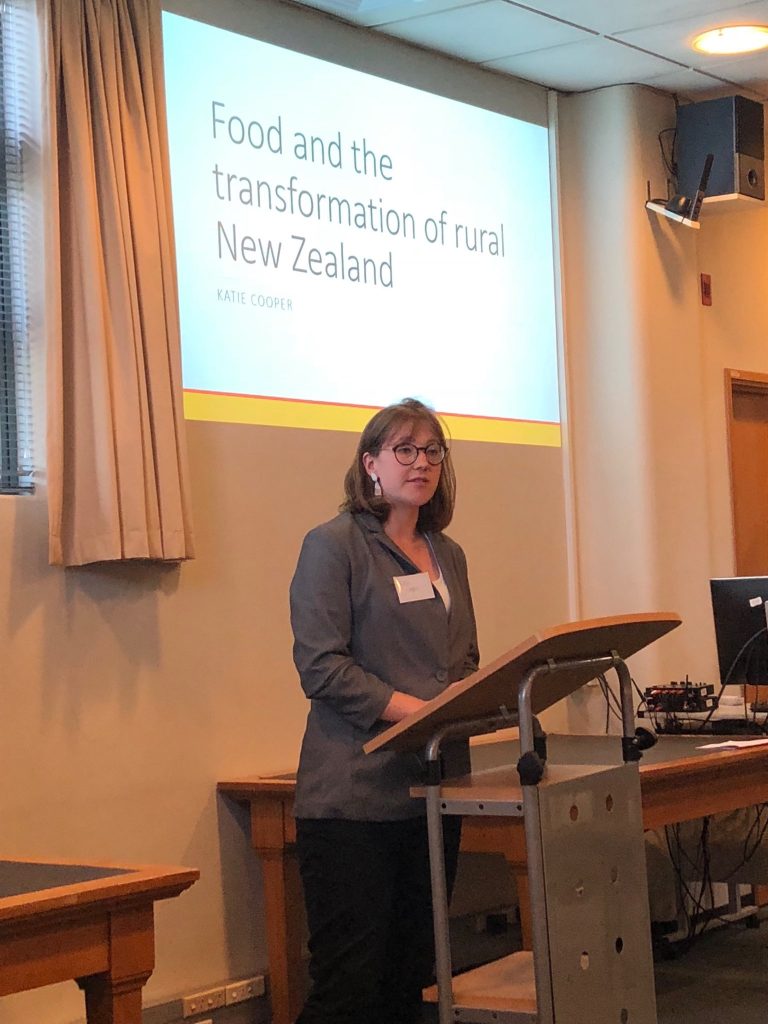
Katie Cooper (Te Papa Tongarewa) presents at the Rural New Zealand symposium in honour of Tom Brooking (photograph by @OtagoBallantyne)
In the final months of 2018 Centre members have gained a number of awards and prizes. Congratulations to Jane McCabe who was presented with the Archives and Records Association of New Zealand Ian Wards Prize for her book Race, Tea and Colonial Resettlement (Bloomsbury, 2017) at a function in Dunedin on 22 November. Jane shares the prize with Shaunnagh Dorsett.
Barbara Brookes continued to gather accolades, winning the prestigious Royal Society Te Apārangi Humanities Aronui Medal for her commitment and contribution to women’s history and New Zealand history more generally.
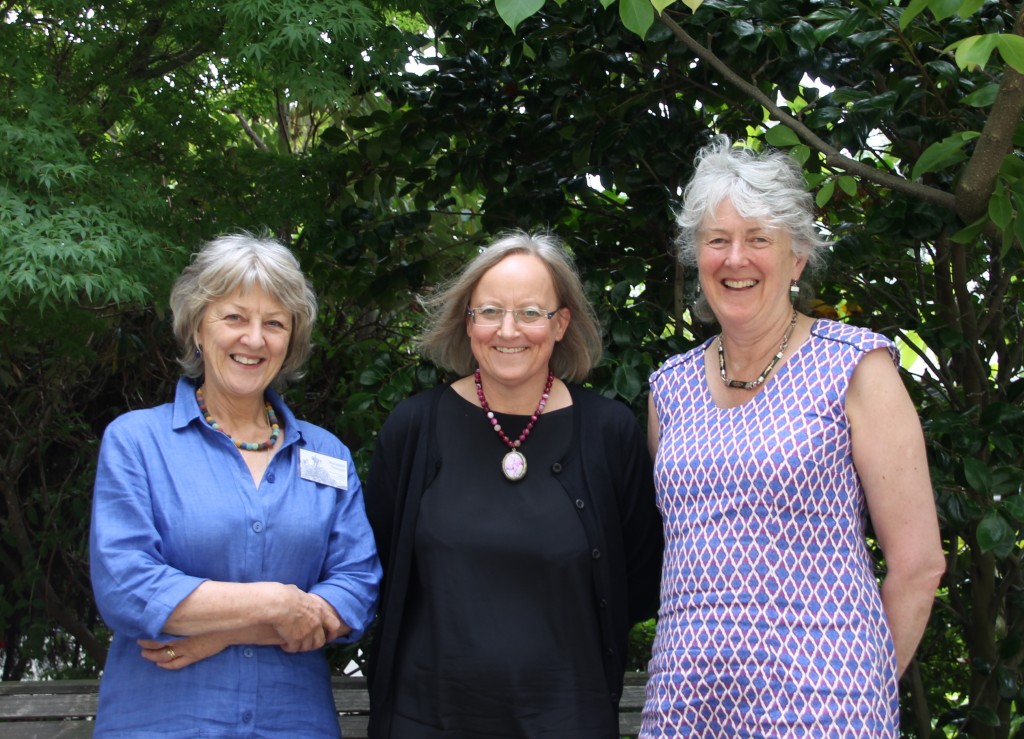
Friends and collaborators: Margaret Tennant, Charlotte MacDonald and Barbara Brookes (photograph by Lachy Paterson)
Kate Stevens and Angela Wanhalla were awarded the Journal of Pacific History’s prize for best article published in 2016-17, and in November Lachy Paterson and Angela Wanhalla were awarded a Royal Society Te Apārangi Marsden Grant (2019-2021) for a project on the histories and legacies of the Māori home front during World War II.
During 2018 a number of publications seeded at Centre events appeared: New Zealand and the Sea, edited by Frances Steel (Bridget Williams Books); Pacific Futures, co-edited by Barbara Brookes (University of Hawaii Press); and Indigenous Mobilities, edited by Rachel Standfield (ANU Press). In addition to these edited books, several special journal issues have appeared from workshops and symposia funded by the Centre. These include a special issue of History of Photography (edited by Jane Lydon and Angela Wanhalla) on Indigenous photographies; a special issue of the Journal of Pacific History on the commodity history of coconuts (edited by Judy Bennett) and an issue of Rethinking History (co-edited by James Dunk and Barbara Brookes) on archives and knowledge production.
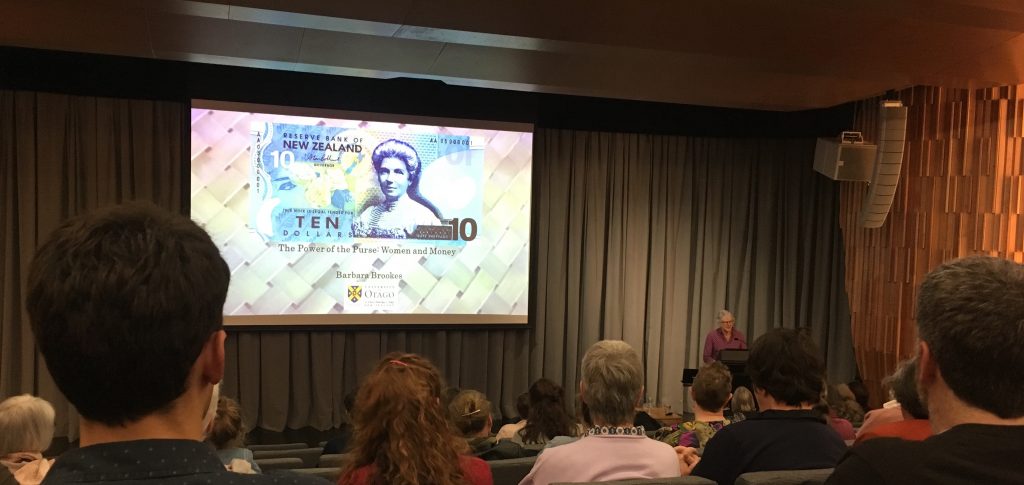
Barbara Brookes giving her keynote address at the Feminist Engagements Conference held in Wellington in September (photograph by @AWanhalla)
We closed the year with the launch of Annabel Cooper’s book, Filming the Colonial Past: New Zealand Wars on Screen.
We have a number of events planned for 2019. The first is Held in Trust: Curiosity in Things, a single-stream two-day conference at Otago Museum in late January 2019 (see poster) organised by Rosi Crane. Keynote speakers are Conal McCarthy, Tony Ballantyne and Simon Ville. Have a look at the Held In Trust Programme.
Our big event for 2019 is a conference to mark the University of Otago’s 150th anniversary in collaboration with the Australasian Victorian Studies Association (AVSA). The theme is 1869 and the CFP will be circulated in early 2019. In the meantime register your interest in attending via 1869@otago.ac.nz

